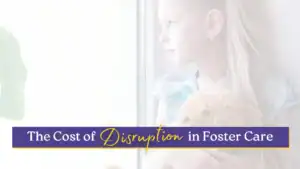Tempered glass covered the driveway. A rock, thrown by my 10-year-old son, had shattered the backboard. Moments earlier, four siblings had been shooting hoops. When the older kids abandoned the game, the youngest was left alone. A crashing sound sent older brother back to the scene. He discovered the little guy, unhurt, but standing among pieces of glass.
Big brother supervised clean-up alongside little brother. After the mess was swept away, our older son called to report the incident. My husband and I left a church meeting and headed home. When we arrived, our little son flashed a proud smile. “I helped clean up the glass!” Then he hopped on his scooter and zoomed off—unaware of the seriousness of his actions.
At first glance, our errant little boy appears to need serious discipline. But there’s more broken here than glass. My son, adopted internationally at age five, has Fetal Alcohol Syndrome. FAS is a disorder under the umbrella of Fetal Alcohol Spectrum Disorders (FASD).
What is FASD?
Fetal Alcohol Spectrum Disorder is a brain-based lifelong physical condition that can affect the brain and body of people who were exposed to alcohol in the womb. According to FASCETS (Fetal Alcohol Spectrum Consultation Education and Training Services), alcohol, drugs, other teratogens, and trauma impact cell growth and cause physical changes in the brain. As a result, these changes affect the structure and function of the brain.
Characteristics of FASD
FASD is an invisible disability. The symptoms present as the challenging behaviors most foster and adoptive parents are familiar with. Below is a list of the primary, secondary, and tertiary symptoms of FASD.
Primary Symptoms
Individuals exposed prenatally to alcohol often have challenges with:
- Developmental level of functioning (dysmaturity)
- Sensory processing
- Nutrition
- Language and communication
- Slow processing pace
- Learning and memory
- Abstract thinking (ex. concepts of money and time)
- Executive Functioning
Secondary Symptoms
If an individual with FASD does not receive the support, understanding, or accommodations they need, the following secondary symptoms may occur:
- Easily fatigued
- Anxious, fearful
- Self isolating
- Overwhelmed
- Argumentative
- Depression
- Frustration and anger
- Poor self-esteem
- Family and/or school problems
Tertiary Symptoms
Tertiary symptoms can occur if, over time, the individual with FASD experiences chronic failure. Therefore, these symptoms are preventable when primary symptoms are addressed appropriately and the individual is well supported with the necessary accommodations:
- Criminal involvement
- Alcohol/drug usage and/or addictions
- Social services involvement
- Legal system involvement
- Suicide
What Foster, Adoptive, and Kinship Caregivers Must Know

According to Proof Alliance, children with FASDs are highly overrepresented in the child welfare system, including foster care and out-of-home placement. On average, a child with FASD is 17 to 19 times more likely to be in the child welfare system than someone without FASD.
In an article written by Ira J. Chasnoff, MD, originally published in the Pediatrics Official Journal of the American Academy of Pediatrics, Chasnoff reports that 86 percent of FASD cases were either missed (80%) or misdiagnosed (6%) in a sample of foster and adopted children.
As a mom of five adopted children—two diagnosed with FAS and two young adults who should have been diagnosed—I believe it is imperative for foster, adoptive, and kinship caregivers to be FASD informed.
Parents and caregivers must become educated about FASD, learn brain-based parenting methods, and become champion advocates. Our kids’ future depends upon it.
Becoming FASD Informed
Considering the startling number of children with FASD in foster or adoptive care, there is still very little training offered to caregivers. Minnesota is one of the only states requiring FASD training for foster parents. Because of this, parents and caregivers must educate themselves to become FASD informed.
Below is a list of my favorite FASD books, podcasts, and training websites:
Books
- Trying Differently Rather Than Harder, by Diane Malbin
- Guided Growth by Ira J. Chasnoff, MD
- The Long Way to Simple, by Stephen J. Neafcy
- Blazing New Homeschool Trails, by Natalie Vecchione and Cindy La Joy
Podcasts
- FASD Family Life
- FASD Hope
- Orphans No More
- FASD Success
Training & Information Websites
Parenting Children with FASD
Traditional parenting methods do not work with children who have experienced childhood trauma—including prenatal exposure to alcohol. Instead, as parents become FASD informed, they recognize and understand the neuro-developmental differences associated with FASD. So, through the lens of FASD, we must ask ourselves, “Could this behavior be caused by a brain difference?”
God knit every child together in their mother’s womb—even those prenatally exposed to alcohol.
Sandra Flach
Once we recognize the brain-based disability, we can then focus on providing supports for the child’s success. Two key supports are focusing on strengths and providing accommodations.

God knit every child together in their mother’s womb—even those prenatally exposed to alcohol. Likewise, He created each child with gifts and talents. Focusing on the individual’s strengths while accommodating their disability helps foster success.
My 18-year-old son, diagnosed with FAS, struggles with learning disabilities. However, he has remarkable hands-on abilities—strengths. As a result, he’s using his welding and carpentry skills at his job in our family’s industrial construction business.
While this son does well working with his hands, he also requires accommodations to be successful on the job and at home. Because of executive function deficits, he requires projects to be broken down into small sections and directions given one step at a time. So without accommodations, he may become frustrated and feel like a failure—both secondary symptoms of FASD.
Advocating for Children with FASD
FASD affects about one in twenty children, while Autism Spectrum Disorder (ASD) affects one in fifty-four. Even though FASD is more prevalent than ASD, parents and professionals are often unaware and uninformed. Consequently, caregivers cannot assume doctors, teachers, employers, or family members understand FASD. As we become FASD informed, we must respectfully educate others while advocating for our kids.
In addition, share the books, podcasts, and resources listed above with those involved in your child’s life. Proof Alliance also offers a Parent Advocacy Toolkit on their website. This downloadable kit includes tips for navigating special education and individual education plans (IEP) and strategies for receiving services. Diversely Designed also provides online IEP coaching.
Moving Forward with Awareness

Let’s take a closer look at the little boy and the broken backboard. Because people with FASD have difficulty with emotional regulation, they can appear to overreact. Executive function challenges make transitions difficult. My son’s brain could not switch from excitement to solitude so quickly. In other words, the abrupt end of the game triggered his reaction. By providing an accommodation, such as a 15-minute warning before ending the game along with reminders every five minutes, the incident may have been avoided.
Satisfied with his clean-up job, the little guy seemed oblivious to the seriousness of his actions. This reveals the disconnect between cause and effect. Individuals prenatally exposed to alcohol struggle with impulsivity. My son lacked the forethought to realize throwing a rock at a glass backboard could cause it to shatter. However, closer supervision might have prevented the incident.
In conclusion, individuals with FASD can experience successful lifelong outcomes if provided the right accommodations. Most importantly, informed caregivers who take a brain-based approach to parenting are key to their success.















